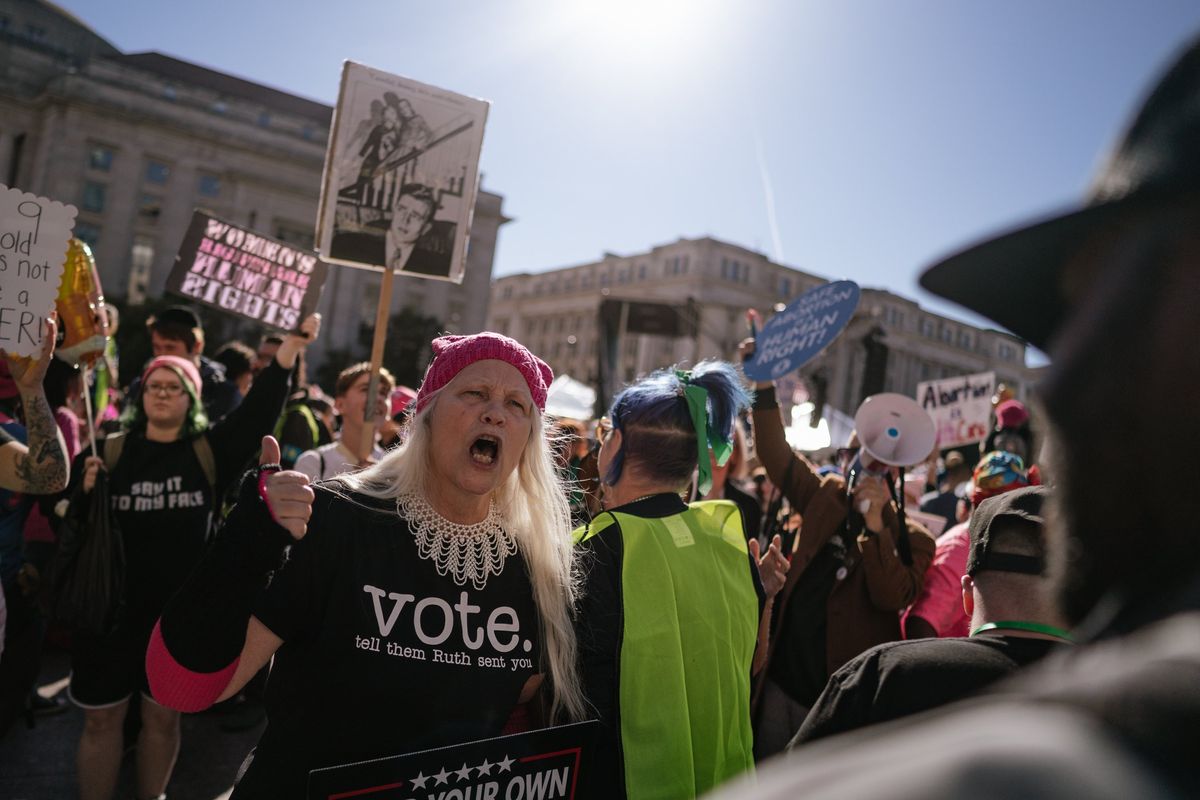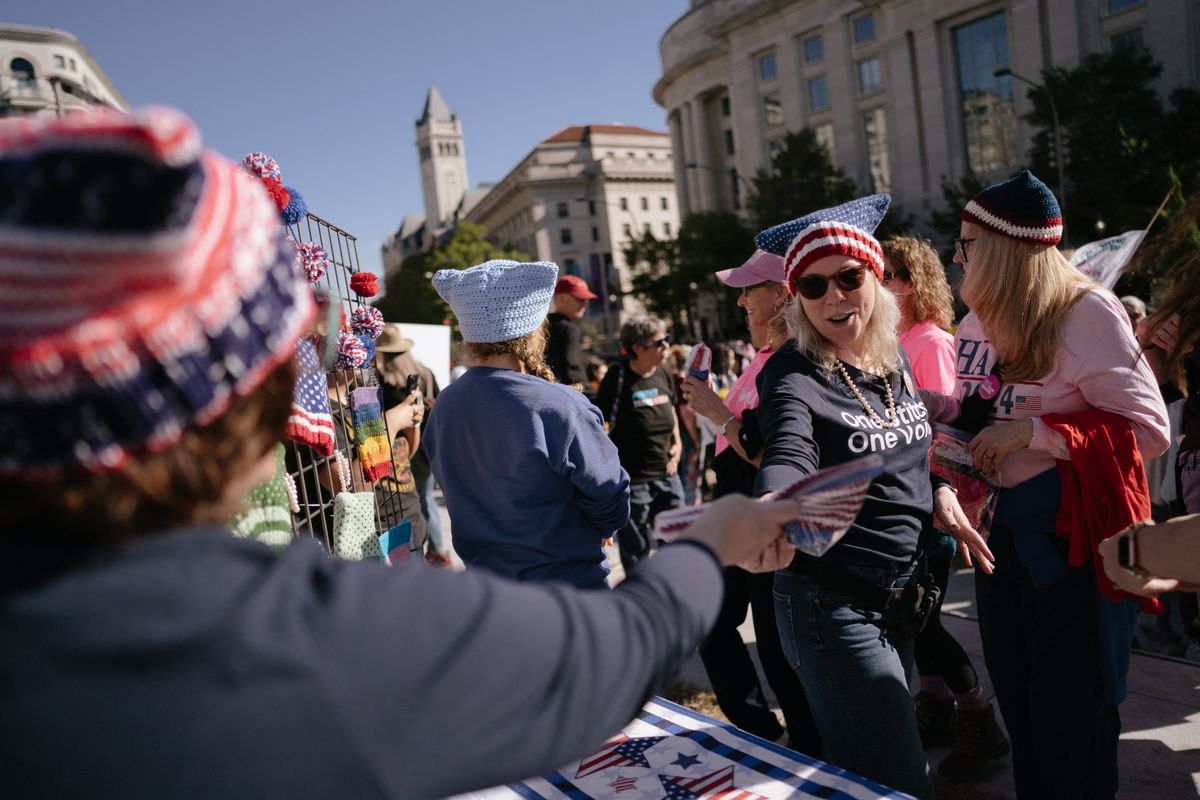Women’s March draws thousands to D.C. to support Harris, abortion rights
Protester Barbara McKinney, 63, from Washington, shouts at counterprotesters at the Women’s March at Freedom Plaza in Washington on Saturday. (Jordan Tovin/For The Washington Post)
In speeches, signs and chants, thousands of women gathered in Washington on Saturday to drive home one message days before the election: “We won’t go back.”
They were part of demonstrations hosted by the Women’s March in the nation’s capital and across the country as a final push to support Vice President Kamala Harris and, they said, to remind undecided voters about the stakes of the election.
Before marching toward the White House, speakers and attendees who filled D.C.’s Freedom Plaza discussed the importance of organizing, touching on a range of issues from gun violence to the war in Gaza.
“This Election Day isn’t just about politics. It’s about survival,” said speaker Aalayah Eastmond, a 2019 graduate of Florida’s Marjory Stoneman Douglas High School, where a gunman killed 17 students and staff in 2018. “Our lives literally depend on what happens at the ballot box.”
The Women’s March movement launched in 2017, the day after Donald Trump’s inauguration, when more than 1 million women poured into the District and elsewhere in what is widely considered the country’s largest single-day protest.
Organizers said 5,000 people RSVP’d for the event in D.C. Rachel O’Leary Carmona, executive director of the Women’s March organization, said in an interview that 10,000 people were in attendance. Additional marches were planned in all 50 states, organizers said.
With polls showing the race deadlocked, O’Leary Carmona said women are channeling their fear of another Trump presidency - and the defeat of yet another woman on the precipice of ascending to the nation’s highest office - into canvassing, calling and texting potential voters in support of Harris and, now, marching.
Before the speeches, demonstrators filled Freedom Plaza with signs in hand with messages like “A woman’s place is in the White House,” and others asking people to “Vote like your daughter’s life depends on it.”
Attendees crowded tables where they could pick up bandannas, T-shirts, socks, pins and mini baby-Trump balloons.
Mona Wells, 70, posed for a photo with two friends, all in matching red, white and blue “pussyhats,” the knit headpieces that have long been emblematic of the Women’s March.
After missing previous marches, Wells said she was excited to finally attend her first this weekend. It felt especially important to be there with the election days away, she said.
“I don’t know how we could be going backwards like this,” she said.
During the speeches, many spoke of the importance of abortion rights as an issue in the election.
Gloria Allred, the prominent women’s rights attorney, told the crowd that she was left hemorrhaging blood and hospitalized decades ago after turning to a nonmedical professional to get an abortion after being raped. A young single mother and teacher at the time, Allred said it was illegal for a doctor to assist her with an abortion. She recalled being at the hospital after the abortion with a 106-degree fever and losing blood when a nurse told her, “Gloria, I hope you’ve learned your lesson.”
“I did learn a lesson: that abortion should be safe, legal and available,” Allred said to a cheering crowd.
Allred referenced Trump’s recent promise to protect women, asking women if they believed him. “Do you believe that he’ll protect you?” she asked. “No,” the crowd roared back.
“I have a message for former president Trump: We don’t believe you that you want to protect women,” Allred said. “Mr. Trump, this is the reckoning.”
One of Wells’s friends, Susana Fernandez, 63, said that while she didn’t think anyone at the march was likely to be an undecided voter, she hoped others would see the event and decide to vote for Harris.
“It’s very important for us that people understand what democracy is,” Fernandez said.
As the speeches drew to a close, the sounds of a drum line filled the air. Thousands of demonstrators began to march toward the White House, chanting and holding signs boasting messages like “I march for the women I love” and “Women’s rights are human rights.”
One woman hoisted the same sign she had made for the first Women’s March in 2017. The Washington Monument loomed over the thousands of people filling the street, and as the sun set the crowd reached the Ellipse.
Earlier, around 3 p.m., more than 50 people lined up in front of a cart selling pussyhats.
Among them were LeAnn Schneider, 66, from Wilton, Connecticut, and Larysa Bemko, 67, from New Hope, Pennsylvania. The pair have been friends for 30 years, and Saturday marked their first time attending the march. They believed the hats symbolized women supporting women.
When asked why they decided to make the trip this year, Schneider said “because Donald Trump, point blank.”
Bemko said they came from a generation of women who advocated for equality, and she fears their work is being undone. In coming to the march, she said, she’s fighting for future generations of women.
“We’re the group of women that fought to get us to here and we’re not going to go back,” Bemko said. “And did we make enough progress? It feels like no so we got to push it forward even more and make it all worthwhile.”
At the edge of the plaza, a man in a T-shirt reading “abortion is murder” stood on a ledge and started yelling through a megaphone. Quickly, a man with a rainbow fan, started yelling over him and the crowd joined in chanting.
As the sun began to set, the drums quietened and demonstrators began to disperse. The thousands of marchers let out one last cheer before heading home.
Also planning to rally Saturday was Lynne Revo-Cohen, 77, who began protesting for women’s rights in 1980 when she took her two daughters, then 4 and 7, to a march honoring women’s history. She’s hopeful that a show of force in the nation’s capital this close to the election will motivate apathetic voters to cast their ballots for Harris.
Revo-Cohen, now a grandmother of five, she said she marches in support of reproductive rights.
“It’s just terrifying to me,” Revo-Cohen, of Reston, said about the overturning of Roe v. Wade. “I want them to have the same rights, or even more constitutional rights, than their grandmother.”
Michelle Greenling, 44, drove to D.C. from her home in Cape May, New Jersey, with her best friend to attend the march. It was the third one the two women have attended together.
A mother of three, Greenling said she’s marching to build a better future for her children, for reproductive rights and for women to be seen as equals.
“We have it a lot better than generations before us, but there’s still a lot of work to be done,” Greenling said. “I’ve never been more concerned about an election. I’m a teacher of history, and I know a lot about our country, and it’s worrisome to see the direction that it’s going in.”
She said she sees the march as a culmination of months of campaigning efforts from around the country and hopes the awareness will inspire people to vote in the next few days.
“We are more determined than ever to protect our families and our communities and our rights from those who loudly and proudly seek to destroy our democracy,” Greenling said. “We just have to win. We have to.”

